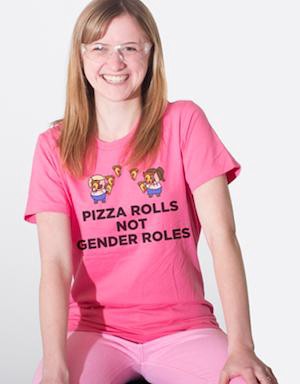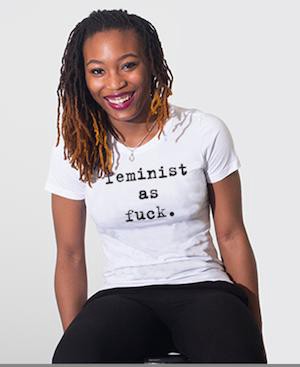Commodity Fetish: This Is Not Really What a Feminist Looks Like
by Arabelle Sicardi

There’s a special drawer in my closet dedicated to lost causes, the clothes I will never wear again but that I can’t find it in me to donate or throw away. They are all, invariably, the slogan shirt — cotton shirts that scream “Fuck H8,” “This is what a feminist looks like,” folded right next to shirts from Hot Topic that say in disparaging gray on gray, “I listen to bands that don’t even exist yet.” Words, words, words. Their sentiments are the same to me in hindsight, really. There were a few years of my life where I wore my politics quite literally on my sleeve.
It’s interesting to dig them up, though, now that these kind of logo-touting feminist agendas are being covered in press. Feminism has been considered a trend since its beginnings, but now it’s not only considered a legitimate means for fashion inspiration, it’s “good for business,” too. In a recent story on Feminist Apparel, a new brand with this specific agenda, Forbes lauded founder Alan Martofel* for being interested in feminist issues and making a business out of it.
Let’s get this out of the way: clothing marketed as feminist apparel is a joke. It’s all a joke. It’s a beautiful, elaborate joke, one tied into capitalism and production and visibility and affect. It’s not just a t-shirt, it never was, and fashion was never just about how good you feel in your clothes. It is also about who made them, the creation of the ideas behind them, who has sold it to you, and how they knew you’d buy it. Clothing might give you agency to be that kind of femme or butch or whatever that you can will yourself to be, but it’s not just about the signals your clothes give off. It’s about how they came to be in the first place, too.
Most of the time, these shirts, from Feminist Apparel and elsewhere, neglect to connect those dots. They shill a bland, cartoon-speckled bumper sticker spread that comes in six different sizes and three different colors. This is the way of the commodity fetish, the inside joke of fashion and Marx. Setting aside romantic notions of fashion as self-actualization — that yes, that shirt might represent your most authentic feminist self — it’s just not enough, or not real. It’s an empty promise. “A commodity appears at first sight an extremely obvious, trivial thing,” Marx wrote. “But its analysis brings out that it is a very strange thing, abounding in metaphysical subtleties and theological niceties.”
These shirts exist at the strange intersection of catchphrases and capitalism, and while feminism is about equality, it’s certainly not not about profiting off of ideas, especially ideas built by marginalized communities. The basis of my discomfort with Feminist Apparel is that the person cashing out is a white man who decided to sympathize with “women’s issues” because he learned about them in school, and then cashed out on it, selling shirts with black bodies on it, shirts that say “feminism is the new black” (a reference to Orange Is The New Black, of course), shirts promoting Hillary Clinton 2016, and so on. The messages might be well-intentioned, and 20 percent of the profits go to a good cause (Women’s Way, a Philadelphia non-profit), but the means of production have been co-opted. You’re buying an idea, plucked from a marginalized group, funneled through a person who never had to deal with those ideas on an intimate level in his life. Someone who learned about sexual assault statistics in school. A politic has been produced and purchased the same way you buy your laundry detergent. And this is what a feminist looks like, the shirt says.
The problem isn’t that these shirts are bad politics, at least not in the originating idea. Being visible and unapologetic about your ideals isn’t something to be laughed about. What’s concerning is that that the conditions of the production of these shirts don’t entirely match up to the causes they intend to promote. Many of the slogans on these graphic Ts — most of them, in fact — didn’t originate from the brand mentioned. They come from marginalized communities, and there’s no mention of any portion of proceeds going back to its origins. More than that, there’s little transparency about who produces them, and how.

Feminist Apparel isn’t the only culprit in this situation, they weren’t the first (though they do market themselves as such), and they won’t be the last. Someone’s always going to try to profit off a political cause. Such is the practice of politics itself. But it is both eternally interesting and discomfiting to note that, in the case of feminist slogans, the ones doing so happen to be white men, and that the most pluckable slogans always happen to be those originating from people of color. Yes, most profits go back to the community: but is that what it means to be an ally? Is this the space feminist fashion should be taking up as siren for The Cause?
I’m happy to see men identifying as feminists, it just becomes more suspect when they’re making profit off of it. Kim France spoke well on the subject with Bitch Magazine recently: fashion might be an industry ripe with female power and persuasion, but at the very top of the ladder, there’s always a man in a suit. From larger corporations to the tiny indie shirt company, there’s almost always an Alan Martofel.
Perhaps because of this — at the very least, taking it into consideration — there’s an endless preoccupation with the legitimacy of fashion in the realm of feminist debate: can it even exist there at all? I would never argue that it doesn’t belong; fashion is the means in which I interpret my own feminism and project my own identities as they fragment and spiral and form over time. But if feminism has taught me anything about fashion, it’s that signs only show you so much. Signs lead to something else. A t-shirt isn’t just a t-shirt, just like a joke is never just a joke. You can’t buy your way into a practice of politics, you don’t fold it away in your closet. You don’t buy good politics and wear it on your sleeve. You live it, you unlearn because of it, and you hear it in your blood. Feminist apparel isn’t something that shrinks when you wash it in hot water. And if nothing else, it’s at least got to have some pockets. Come on.
*Martofel once asked me to be ambassador for his brand. I did not respond to his email.
Arabelle Sicardi is a fashion and beauty writer for the likes of Rookie, Teen Vogue, Refinery29 and The Style Con. She likes makeup, cyborgs, and bad fashion puns.